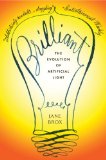Summary | Excerpt | Reviews | Beyond the Book | Readalikes | Genres & Themes | Author Bio

Critics' Opinion:
Readers' Opinion:
First Published:
Jul 2010, 368 pages
Paperback:
Jul 2011, 368 pages
 Book Reviewed by:
Book Reviewed by:
Jo Perry
Buy This Book
Brilliant
Light -- so precious within -- was even rarer on the streets of the cities, towns, and villages of the past, for before the seventeenth century street lighting was almost non-existent everywhere in the world. A fourth-century inhabitant of the Syrian city of Antioch claimed: “The light of the sun is succeeded by other lights…. The night with us differs from the day only in the appearance of the light.” And geographer Yi-Fu Tuan notes that in China, “Hang-chou boasted a vigorous night life along the crowded Imperial way before the Mongols invaded the Sung capital in A.D.1276.” But other Chinese cities were dark except during the New Year and on the Emperor’s birthday, when torches lined the roads and the skies flared with fireworks. Renaissance Florence had no streetlights, nor did Imperial Rome, of which Jérôme Carcopino writes: “No oil lamps lighted [the streets], no candles were affixed to the walls; no lanterns were hung over the lintel of the doors, save on festive occasions when Rome was resplendent with exceptional illumination to demonstrate her collective joy, as when Cicero rid her of the Catilinarian plague. In normal times night fell over the city like the shadow of a great danger.… Everyone fled to his home, shut himself in, and barricaded the entrance. The shops fell silent, safety chains were drawn across behind the leaves of the doors; the shutters of the flats were closed and the pots of flowers withdrawn from the windows they had adorned.”
In Europe during the Middle Ages, the close of day was unmistakably announced with the clanking and groaning of bells: bells were always ringing from ramparts and cathedral towers, from the belfries of convents, monasteries, and country churches -- to warn of invasions, fires, and thunderstorms; to announce the celebration of marriage and the arrival of royalty; the impending death of a parishioner, and, after death, to solicit prayers for the departed soul. Their sounding shaped time into holy hours -- matins, lauds, prime -- and marked the ordinary – the start of work, the opening of markets, the respite of noon. Come dusk the vespers bells rang, calling for the holy office of the lights when the candles and torches of the churches were lit. Vespers, meaning evening star, the word itself dying on a silky whisper: hour for prayers of thanksgiving, and for prayers to the Virgin -- the Ave Maria – since people believed the Annunciation took place in evening.
Soon after, the curfew bell tolled, often more than a hundred times. In the early Middle Ages it sounded just after dusk; in later centuries, especially in winter, it rang several hours after sunset, but always it held an unwavering meaning: in a time before street lighting or organized police forces, the only way to maintain order was to strictly control the comings and goings of citizens, so at curfew all the day’s labor stopped. Blacksmiths laid down their bellows, goldsmiths ceased beating out metal. In the markets trading halted, and the cries of butchers and fishwives subsided. The sounds of clinking harnesses, creaking wagons, and the plodding tread of oxen decayed into silence as almost everyone – per order of the authorities -- returned to their dwellings, locked their doors, and shuttered their windows.
If inhabitants of fortified cities and towns found themselves beyond the gates at the sound of curfew, they made true haste since officials, to prevent intruders from entering under the cover of dark, locked the perimeter gates. Anyone caught beyond them risked being fined or shut out for the night. Such a practice persisted in some places even into the eighteenth century: “About half a league from the city [of Geneva],” Jean-Jacques Rousseau attests, “I hear the retreat sounding; I hurry up; I hear the drum being beaten, so I run at full speed: I get there all out of breath, and perspiring; my heart is beating; from far away, I see the soldiers from their lookouts; I run, I scream with a choked voice. It was too late.”
Excerpted from Brilliant by Jane Brox. Copyright © 2010 by Jane Brox. Excerpted by permission of Houghton Mifflin Harcourt. All rights reserved. No part of this excerpt may be reproduced or reprinted without permission in writing from the publisher.





The Funeral Cryer by Wenyan Lu
Debut novelist Wenyan Lu brings us this witty yet profound story about one woman's midlife reawakening in contemporary rural China.
Your guide toexceptional books
BookBrowse seeks out and recommends the best in contemporary fiction and nonfiction—books that not only engage and entertain but also deepen our understanding of ourselves and the world around us.